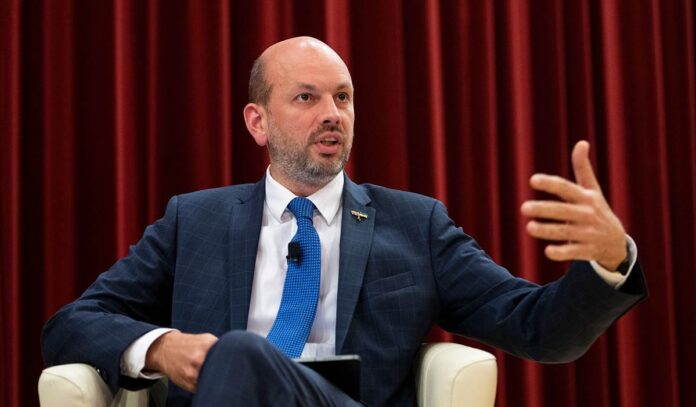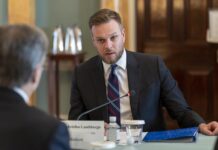
Earlier this month, Ottawa Life Magazine published Mckenzie Donovan’s interview with Lithuanian Ambassador to Canada Darius Skusevičius. He introduces today’s Lithuania as having a highly developed economy and high standard of living, making it comparable with any other European Union State. Lithuania borders Russian Kaliningrad and Russian-aligned Belarus and has been at the forefront of the new frontier between Russia and NATO since the Russian occupation of Crimea in 2014 and the subsequent Invasion of Ukraine by Russia in 2022.
The Ambassador explained that Lithuania-Canada relations in 2023 are primarily community-based. Today, there are about sixty thousand Lithuanians across Canada in all the major cities in the country and the Northern territories. He noted that Canada has always been a good partner and never recognized Lithuania’s annexation into the Soviet Union. Canada was the first G7 country to recognize its regained independence in the 1990s.
Just a few years ago Lithuania and Canada celebrated 30 years of restored diplomatic relations. In the past three years two Lithuanian Foreign Ministers visited Canada and two Canadian Foreign Ministers went to Lithuania for different events. Recently, the Senate speaker and a delegation visited Lithuania. Canada is also upgrading their presence in Lithuania to an embassy level. According to Skusevičius, more and more Europeans are finding Canada, and more and more Canadians are finding Europe – first of all, due to global challenges that need to be addressed together in defending rules-based world order, supporting Ukraine’s victory, supply chain disruptions, and the need to develop Lithuanian capabilities. Canada is a very valuable partner to Lithuania because of the resources and capability to be less dependent on other countries. He considers that the Canada-Lithuania relationships have a great trajectory, and great potential.
Bilateral trade with Canada is relatively low. It was about 150 million euros last year, including both imports and exports. Services show growth, but although the numbers sound small – about 15 million euros in 2021 – last year it was 30 million euros, so it almost doubled. But there are some very impressive examples of business growth. For VPN users – Surfshark and Nord VPN are Lithuanian companies, and Canada is a top ten market spot for them. In Toronto, one of the logistical companies working at the Toronto airport and other airports – Wright International, is owned by Lithuanians. Another company, Teltonika, just entered the Canadian market and is making sales all around North America. They produce routers and battery charging stations. The company is number one in Europe for GPS trackers used in cars. Their sales in the Canadian market are growing exponentially.
Lithuania is entirely independent from Russian gas, on which it depended heavily for a long time, but has now been able to manage on its own, having acquired its LNG terminal through a ship on the coast called Independence. “The world needs LNG and other energy resources from Canada,” said the Ambassador.
With global food chain disruption, the world needs Canadian agricultural production and Canadian fertilizers like potash. There are three major players in this industry – Canada, Russia, and Belarus. Because of the unprovoked war in Ukraine and human rights violations, and subsequent EU sanctions, Canada has become Lithuania’s number one partner in providing those resources.
Another area is rare earth minerals, in which Canada is one of the world’s wealthiest countries. Lithuania needs it directly, because some sectors of its economy are using these resources in production, and Canadian input into Western supply chains helps Lithuania to diversify and develop its own capabilities. It costs more, but the Western world produces resources with more environmental and employee protection. Lithuania must understand that the price must be paid if it wants to move forward.
In the Ambassador’s opinion, because Lithuania is a member of NATO, its proximity to the Kaliningrad Oblast and Belarus does not detract from its popularity as a travel destination.
Numbers are still low due to the effects of COVID, but there are more tourists coming from Canada. Visiting Lithuania brings tourists closer to other points of interest in the region – Estonia, Latvia and Poland. Especially at the beginning of the war in Ukraine last year, people thought they couldn’t travel to the region. “However, even in Kyiv now things are relatively safe and Ukrainians are returning to their capital to live and create and run their businesses, so it is definitely safe to travel to Lithuania and our region”, said Skusevičius.
With regard to the Russian-speaking population of Lithuania, which is less than 5 percent, the Ambassador noted that the threat of Russian influence is very small, societal resilience to propaganda is very high, and the government is taking steps to prevent unrest from happening. For example, Russian TV channels and propaganda are banned in Lithuania. There are active civil organizations that debunk all the myths that are spread by pro-Russian or Russian-linked propagandists. Recent measures just adopted by the parliament ensure that Russian citizens will not be able to get a visa to visit Lithuania for one upcoming year. “We live with Russia as a neighbour, we understand better than anybody else what neighbour we have, and we address this challenge accordingly.”
If Belarus were to join the conflict in Ukraine on Russia’s side, Ambassador Skusevicius noted that every new mobilization in the region and additional forces and military equipment by Russia worsens Lithuania’s security situation, but the capacity for defence in the region is in place and NATO defence plans are constantly being updated. “NATO is our security guarantor. At the same time, we take security challenges in our neighborhood very seriously – Lithuania is spending almost 2.5 percent of its GDP on defence and looking at how to plan for the concept of total defence, including through civil society organizations. … With Finland becoming a member of NATO and Sweden to become one hopefully soon, situation changes again. NATO border with Russia has almost doubled. To sum up – yes, we have challenges, but we are moving forward collectively to address those challenges.”
Regarding the war on Ukraine, the aggressor must be stopped, and the only way to do so is to support Ukraine until its total victory.





























